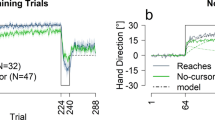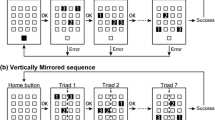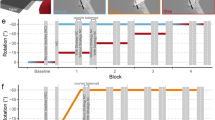Abstract
Experimental work shows that some motor skills are retained well over a long delay and others are not. It is possible that motor tasks that are primarily implicit are retained over long intervals, whereas those with an explicit component are subject to more rapid forgetting. To test whether implicit motor skills are retained, 24 (experienced) participants were retested after a one-year delay for their retention of an implicit motor sequence. They had been trained on the sequence in a button-pushing task. Although the experienced participants responded faster than they had a year earlier, they showed no retention of the sequence compared to 24 participants who had received no training a year earlier, and no savings in relearning the sequence. The overall speed effect may indicate that the amount of training is crucial to the degree of retention of a skill. The results indicate that it is not the case that implicit motor skills are well retained whereas those with an explicit component are not.
Similar content being viewed by others
References
Adams, J. A. (1987). Historical review and appraisal of research on the learning, retention, and transfer of human motor skills. Psychological Bulletin, 101, 41–74.
Ammons, R. B., Farr, R. G., Bloch, E., Neumann, E., Dey, M., Marion, R., & Ammons, C. H. (1958). Longer-term retention of perceptual-motor skills. Journal of Experimental Psychology, 55, 318–328.
Bell, H. M. (1950). Retention of pursuit rotor skill after one year. Journal of Experimental Psychology, 40, 648–649.
Corkin, S. (1968). Acquisition of motor skill after bilateral medial temporal lobe excision. Neuropsychologia, 6, 255–265.
Curran, T., & Keele, S. W. (1993). Attentional and nonattentional forms of sequence learning. Journal of Experimental Psychology: Learning, Memory, and Cognition, 19, 188–202.
Eslinger, P. J., & Damasio, A. R. (1986). Preserved motor learning in Alzheimer's disease: Implications for anatomy and behavior. Journal of Neuroscience, 6, 3006–3009.
Fleishman, E. A., & Parker, J. F. (1962). Factors in the retention and learning of perceptual-motor skill. Journal of Experimental Psychology, 64, 215–226.
Graf, P., & Schacter, D. L. (1985). Implicit and explicit memory for new associations in normal and amnesic subjects. Journal of Experimental Psychology: Learning, Memory, and Cognition, 11, 501–518.
McGeoch, J. A. (1932). The comparative retention values of a maze habit, of nonsense syllables, and of rational learning. Journal of Experimental Psychology, 15, 662–680.
McGeoch, J. A., & Melton, A. W. (1929). The comparative retention values of maze habits and of nonsense syllables. Journal of Experimental Psychology, 12, 392–414.
Nelson, T. O. (1978). Detecting small amounts of information in memory: Savings for non-recognized items. Journal of Experimental Psychology: Human Learning and Memory, 4, 453–468.
Neumann, E., & Ammons, R. B. (1957). Acquisition and long-term retention of a simple perceptual motor task. Journal of Experimental Psychology, 53, 159–161.
Nissen, M. J. & Bullemer, P. (1987). Attentional requirements of learning: Evidence from performance measures. Cognitive Psychology, 19, 1–32.
Nissen, M. J., Willingham, D. B., & Hartman, M. (1989). Explicit and implicit remembering: When is learning preserved in amnesia? Neuropsychologia, 27, 341–352.
Reber, P. J., & Squire, L. R. (1994). Parallel brain systems for learning with and without awareness. Learning and Memory, 1, 217–229.
Willingham, D. B., Nissen, M. J., & Bullemer, P. (1989). On the development of procedural knowledge. Journal of Experimental Psychology: Learning, Memory, and Cognition, 15, 1047–1060.
Author information
Authors and Affiliations
Corresponding author
Rights and permissions
About this article
Cite this article
Willingham, D.B., Dumas, J.A. Long-term retention of a motor skill: Implicit sequence knowledge is not retained after a one-year delay. Psychol. Res 60, 113–119 (1997). https://doi.org/10.1007/BF00419684
Received:
Accepted:
Issue Date:
DOI: https://doi.org/10.1007/BF00419684




